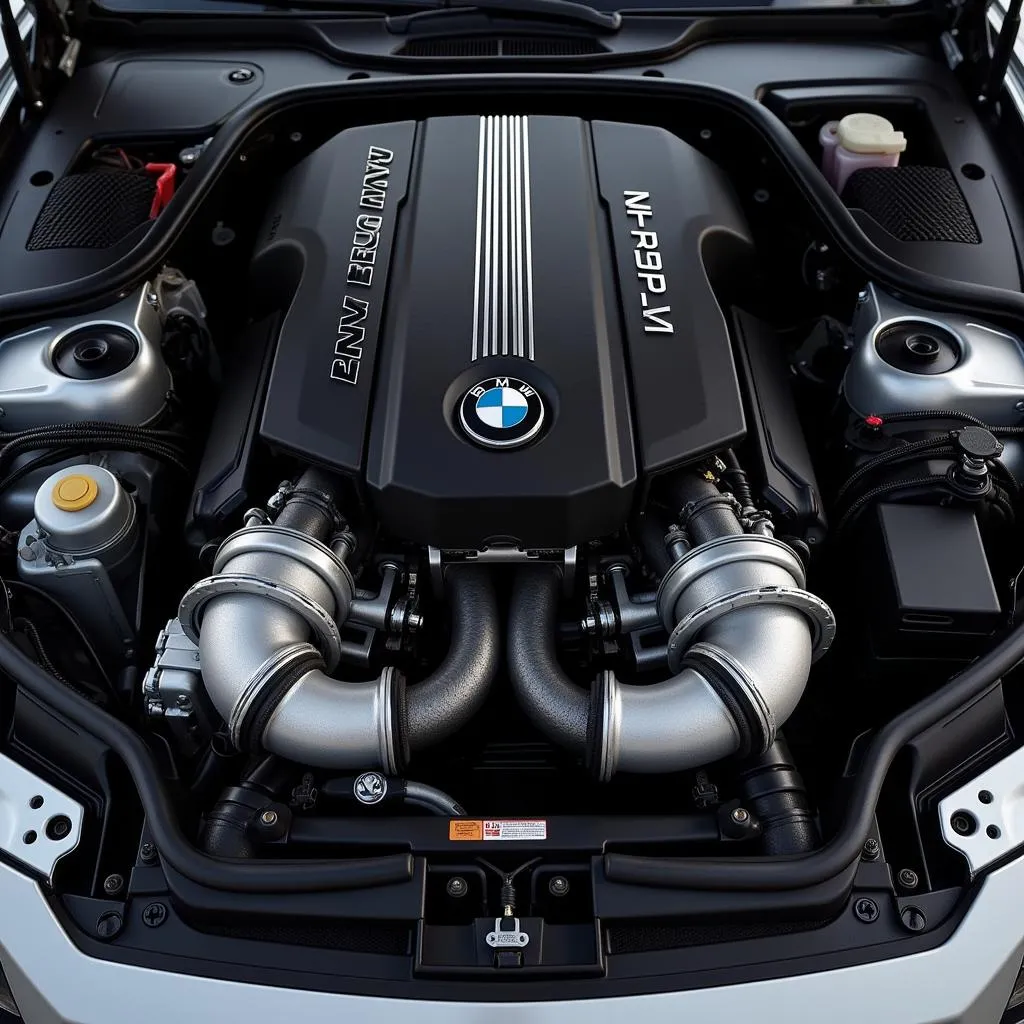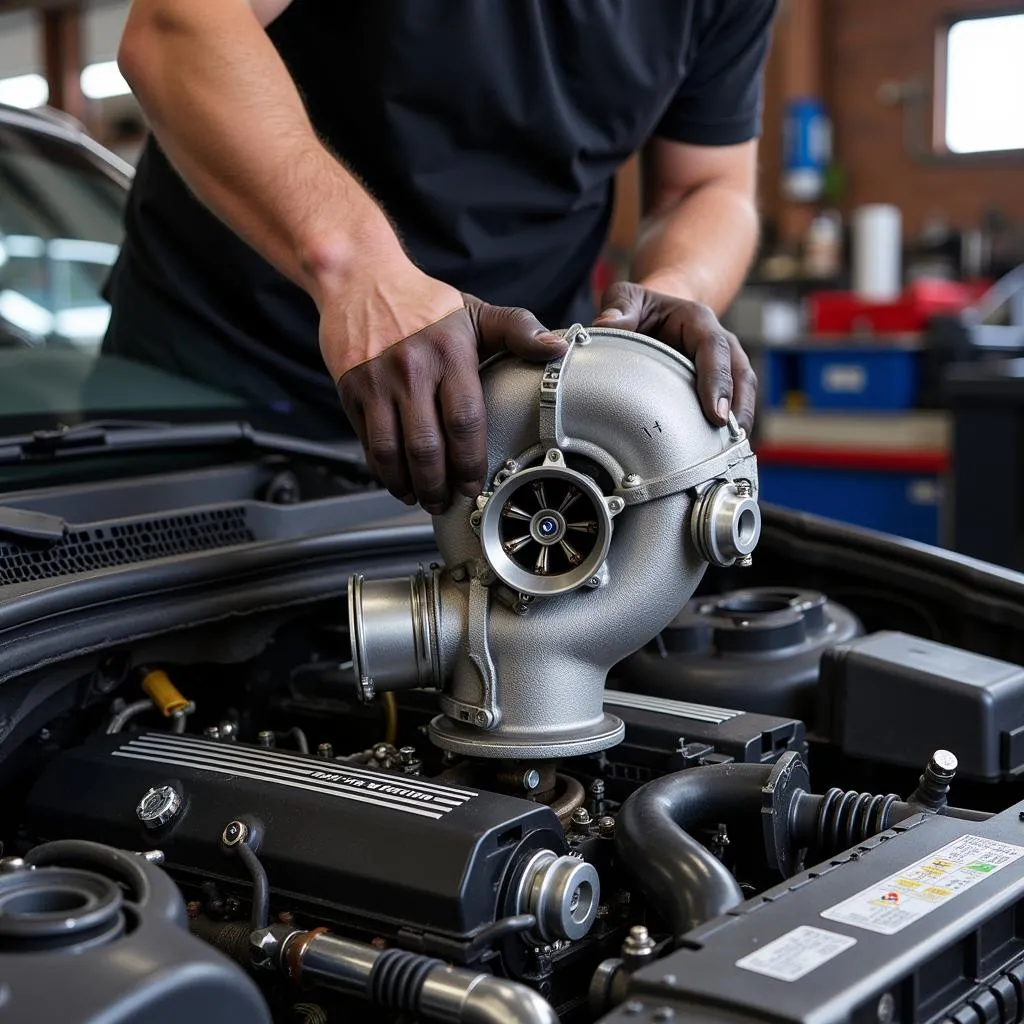The BMW N54 Turbocharger: Power, Problems, and Prevention
The BMW N54 engine, known for its twin-turbocharged power and smooth delivery, has been a popular choice among performance enthusiasts since its debut in 2006. At the heart of its performance lies the BMW N54 turbocharger, a critical component responsible for boosting power output and creating that signature BMW driving experience.
Understanding the BMW N54 Turbocharger System
The N54 utilizes a twin-turbocharger system, meaning it uses two smaller turbochargers instead of one large one. This setup allows for quicker spool-up times and minimized turbo lag, resulting in impressive low-end torque and a more linear power delivery. Each turbocharger is responsible for feeding air to three cylinders, ensuring optimal performance across the entire RPM range.
 BMW N54 Engine Bay with Twin Turbochargers
BMW N54 Engine Bay with Twin Turbochargers
Common BMW N54 Turbocharger Problems
While the N54 engine is lauded for its performance, its turbochargers are often cited as a potential weak point. Here are some common issues N54 owners may encounter:
- Wastegate Rattle: The wastegates, responsible for regulating boost pressure, can become worn or malfunction, leading to a rattling noise, particularly during acceleration.
- Turbocharger Failure: A variety of factors like oil starvation, overheating, or wear and tear can lead to complete turbocharger failure, resulting in significant power loss and potential engine damage.
- Boost Leaks: Leaks within the intake system, such as cracked charge pipes or loose clamps, can disrupt boost pressure, leading to reduced power and potential engine codes.
- Carbon Buildup: Like many direct-injection engines, the N54 can suffer from carbon buildup on the intake valves, potentially affecting turbocharger performance and overall engine efficiency.
Signs of a Failing BMW N54 Turbocharger
Identifying potential turbocharger issues early can save you from costly repairs and potential engine damage. Be on the lookout for these warning signs:
- Whining Noises: A high-pitched whining sound coming from the engine, especially under acceleration, can indicate a failing turbocharger bearing.
- Excessive Smoke: Blue smoke from the exhaust, particularly during acceleration, is a sign of oil leaking into the combustion chamber, often a symptom of turbocharger failure.
- Loss of Power: A noticeable decrease in engine power and responsiveness can indicate a problem with the turbocharger system, such as a boost leak or failing turbo.
- Check Engine Light: The check engine light can illuminate for various reasons, but turbocharger-related issues will often trigger codes related to boost pressure or wastegate function.
BMW N54 Turbocharger Replacement Cost
Replacing a turbocharger on a BMW N54 can be an expensive affair. Depending on whether you choose OEM or aftermarket parts, labor costs, and the overall condition of your vehicle, the total cost can range from $2,000 to $5,000.
Preventing BMW N54 Turbocharger Issues
While some turbocharger issues are unavoidable due to wear and tear, proactive maintenance can significantly extend the life of your N54’s turbochargers:
- Regular Oil Changes: High-quality synthetic oil and frequent oil changes are crucial for keeping the turbochargers properly lubricated and functioning optimally.
- Cooling System Maintenance: The N54 generates significant heat, and a well-maintained cooling system is essential to prevent overheating and potential damage to the turbochargers.
- Avoid Aggressive Driving Habits: Allowing the engine to cool down after hard driving can help prevent premature wear and tear on the turbochargers, especially after high-boost situations.
 Mechanic Replacing BMW N54 Turbocharger
Mechanic Replacing BMW N54 Turbocharger
Frequently Asked Questions about BMW N54 Turbochargers
Q: How long do BMW N54 turbochargers last?
A: The lifespan of N54 turbochargers can vary greatly depending on driving habits, maintenance, and overall operating conditions. However, with proper care, they can typically last between 80,000 to 150,000 miles.
Q: Can I upgrade my BMW N54 turbochargers?
A: Yes, several aftermarket companies offer upgraded turbocharger options for the N54 engine, offering increased boost pressure and potential for higher horsepower gains.
Q: How can I tell if my BMW N54 has a boost leak?
A: A boost leak can manifest as a loss of power, hissing noises from the engine bay, or the presence of a check engine light with boost-related codes.
Q: Is it worth fixing a BMW N54 turbocharger?
A: Whether or not to repair or replace a failing turbocharger depends on the severity of the damage, the age of the vehicle, and your budget. In many cases, repairing or replacing a faulty turbocharger can be a worthwhile investment, especially if the rest of the engine is in good condition.
Get Expert Help with Your BMW N54
While this article provides general information about the BMW N54 turbocharger, it is essential to remember that each vehicle and situation is unique. If you are experiencing problems with your BMW N54 turbocharger or have concerns about its performance, it’s crucial to seek professional advice from experienced BMW technicians or specialized workshops.
For expert assistance, contact us via WhatsApp at +1(641)206-8880, email us at [email protected], or visit our workshop located at 276 Reock St, City of Orange, NJ 07050, United States. Our team of dedicated professionals is available 24/7 to provide you with the highest quality service and support for all your BMW needs.
